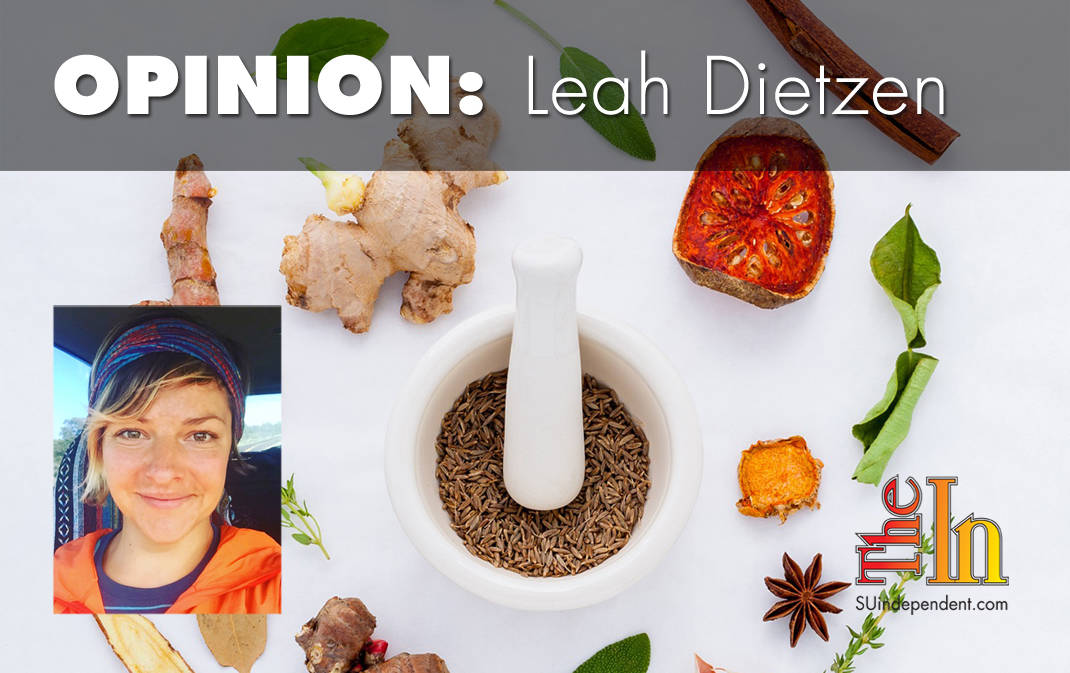 I’m sitting here at my computer desk beside an empty pint of Coconut Bliss ice cream, a kombucha bottle, and an enchilada frozen dinner that I microwaved in four minutes. It’s all vegan, so there’s slight justification and vindication in that, but not much. Also, I ate the ice cream first. The irony is pungent and ripe.
I’m sitting here at my computer desk beside an empty pint of Coconut Bliss ice cream, a kombucha bottle, and an enchilada frozen dinner that I microwaved in four minutes. It’s all vegan, so there’s slight justification and vindication in that, but not much. Also, I ate the ice cream first. The irony is pungent and ripe.
Here’s the thing: I struggle to make good choices for myself and for my body. I have a penchant for self-destructive and self-defeating thoughts and behaviors that would win awards if there were such a glorious competition. I want to come across like I know what I’m doing and have it all together, but in truth, it’s a constant dance of two steps forward, one step back. Or, more often, how can I make the fact that I just fell flat on my face look like some super-hip, cool new dance move?
The truth is, I have had a pretty miraculous journey into healing through food. But here’s the other thing: It’s a journey, not a destination, and I am never going to arrive. There’s a sense of defeat and humiliation that my ego feels deeply every time I fall short of my expectations and also a keen sense of peace at the acceptance that I’m never going to be perfect, and that’s OK, too. Vulnerability, humility, and self-honesty are as much a part of my healing journey as has been the food, if not more. But I still never stop trying, because here’s the thing: This is a journey into self-love, and the contrast reminds me where I find my balance, my acceptance of exactly where I am at in each moment.
Now, as far as the depression goes, I wasn’t always a moody kid; in fact, I remember my early childhood as exceptionally bright. I could usually be found in my dirty high-top converse sneakers climbing trees, wandering the fields with my dogs, and riding my horse bareback. I loved to read, write, and draw and could outrun and outbelch all the boys in my school. I do remember my first mood swings occurring around fifth grade. They were always during and after lunch period and consisted of extreme highs of singing and laughing followed quickly after by lethargy, sadness, or anger. I don’t think anyone ever even realized this, but with age and wisdom I can reflect and realize that my lunches were almost completely filled with processed and high-sugar foods.
My real descent into depression and anxiety began when I hit my pre-teens — not very shocking, as that is seen as the norm in our society. But mine was exceptionally difficult, and I was sent to counselors and put on high doses of medication. I still struggled deeply, wading through phases of self-harm, drug and alcohol abuse, or complete apathy. The medication helped but did not heal.
And yet I was generally still a happy and athletic kid. Not once did I (or anyone around me) consider that my diet was affecting my moods. I just believed the story that depression and anxiety were genetic traits in my family and that I was the one who was getting hit the hardest.
It was a car accident that brought on my fibromyalgia and an end to any physical activity for almost a decade. It was a dark period and one that has shaped and formed my life in powerful ways. I stayed in that place of pain, deep depression, and anxiety for a long time. I’ll be honest: I was afraid, stubborn, afraid, and desperately holding onto the story of illness. It was what I knew; it was what defined me. I was afraid to change from the way I was raised and what I knew and was surrounded by. I was comfortable in the murky place inbetween. And I had no contrast, so I thought this was how life was supposed to be for everyone: a lot of happy moments bookended more often than not with anxiety, sleeplessness, sleeping too much, constant pain, and deep bouts of depression. And other people seemed just fine eating the same foods I ate.
It was a near-death experience that finally made me take a good, hard look at my life. I was afraid to make these changes. But if I was going to heal, I knew I needed to do it. I knew there had to be a better way than the life I’d been living, and I was tenacious in being willing to do whatever it took.
It began with a book literally falling off of a shelf in front of me. It was about eating an alkaline and whole-foods diet to heal your body. I quickly began a 30-day detox where I could only eat vegetables, fruits, non-processed organic meats, herbal teas, and nuts and seeds. Before this, I existed on sugar, more sugar, Pasta Roni, granola bars, hamburgers and fries, and those cheap Polish sausages. I was diving into the deep end — and quite frankly, I couldn’t swim. My body immediately went into detox mode, and I felt worse than I’d felt in years. I had blinding headaches, my pain went from a consistent six to a blazing nine, I couldn’t sleep, I had panic attacks, and I cried uncontrollably at times and laid listlessly on the couch. As horrible as that seems, something in me knew I had to stick it out.
After about a week, I began to feel amazing in ways I never knew was possible. The world actually seemed brighter, I had more energy, I was happy. It was so weird. I was given a contrast, shown a world I’d never knew existed. Those 30 days found me peaceful, more relaxed, and happier than I’d been in years. Then the detox ended, and my history for poor choices reared its ugly head. I immediately ate a Snickers bar, and the shock to my body was horrific. I literally felt like I’d been hit by a bus and spent a good hour on an emotional rollercoaster.
The next six years have been the dance: two steps forward, one step back. Face plant, shake yourself off, and get back up again. What I have learned through hard-won experience is that processed sugar and processed foods are bad news for my body. My food needs to be as close to the source as possible. Did it just come from the tree? The earth? Or has it been somehow altered and modified? I have realized that my body does not do well with dairy (it’s typically highly processed). And at some point, my body decided that meat didn’t make it feel good, either.
Here’s the thing: None of these were easy changes for me to make. I went through a lot of emotional struggles regarding letting go what I knew, disliking being different, being labeled and ridiculed by others, and constantly reverting back to old self-defeating habits and patterns. But the journey has still been consistently uphill. I now rarely have full-on ice cream binges, unless or course I’m trying to write an article on health food. I eat a mostly raw vegan diet. I still have a crazy sweet tooth, but I now indulge it with cacao and cane-sugar chocolate bars. Progress, not perfection.
And I have learned to listen to my body and heart. My journey is mine alone to take, and I had to figure out the process that worked for me. But the rewards have been invaluable. Not only do I have a better self-esteem than I’ve ever had but I no longer take any medications, and I enjoy a relatively emotionally stable existence balanced by the realization that I am also just a sensitive human who feels more and cries often, and that’s OK. I am also back to running through fields with dogs, riding horses bareback, and of course climbing trees.
I have also seen the blessings extend out to my own family members as they have slowly adopted their own food practices that work for them. We have all learned from my healing journey as my turnaround was truly quite miraculous. The other day, my oldest sister shared with me a story that moved me immensely. My niece Bella — who is quite similar to me in her sensitivity to others, animals, nature and has a happy and easygoing nature — was starting to experience bouts of depression. My sister told me she knew immediately that the first step was to change the foods they all ate, that she didn’t want my healing journey to be wasted, and that my wisdom could be shared to help Bella and the rest of her family. My desire is that my journey may also help provide you with healing as well. Small steps are important steps, too. As my mom has always said, “How do you eat an elephant? One bite at a time.” Here’s to enjoying the dance, two steps forward, one step back.



